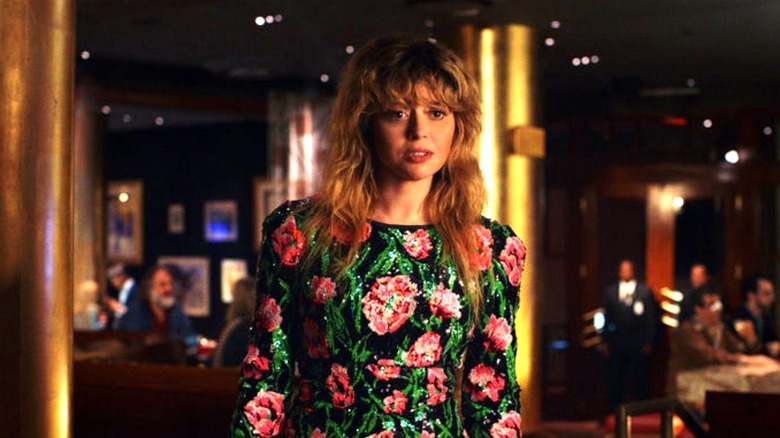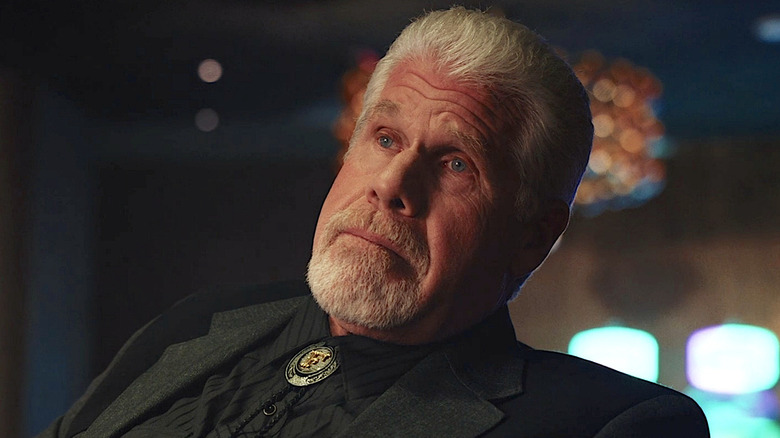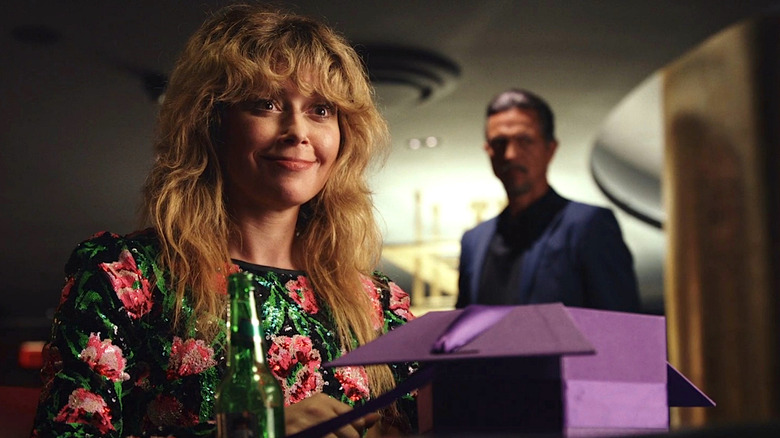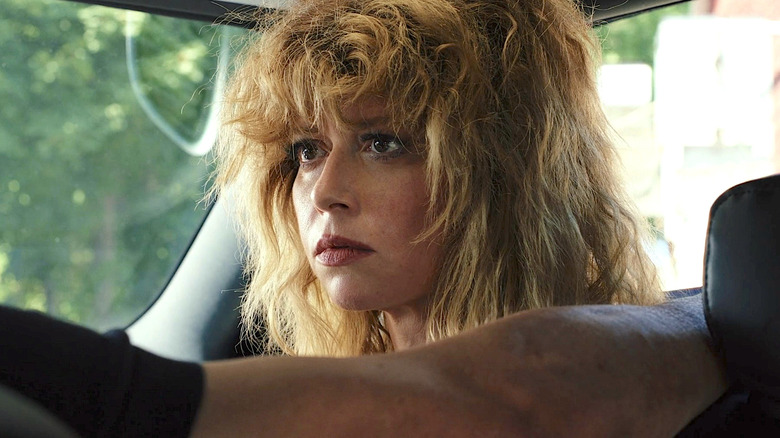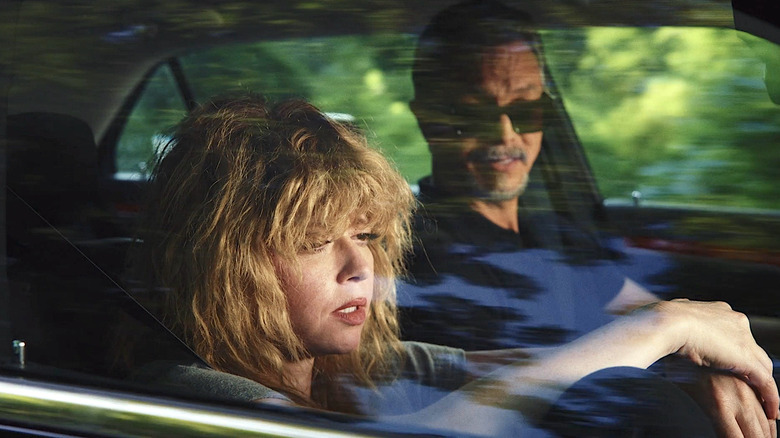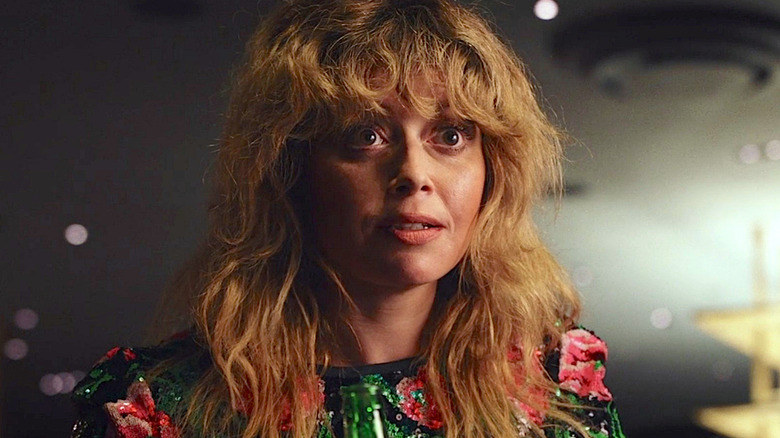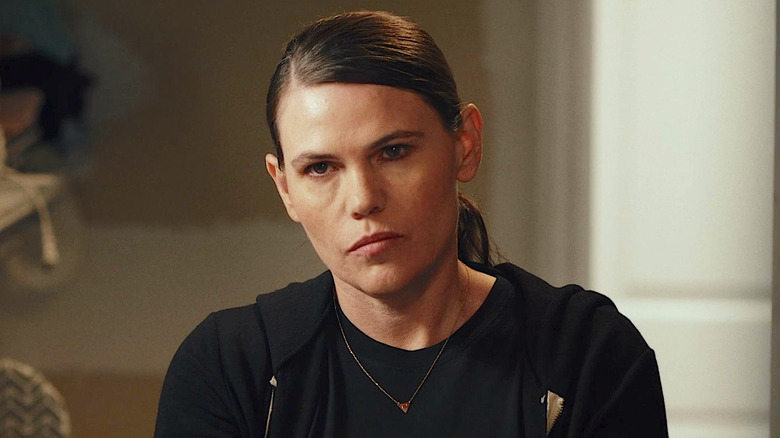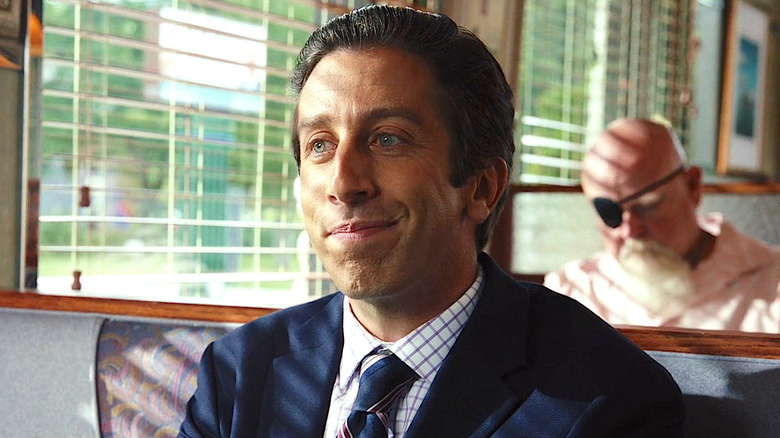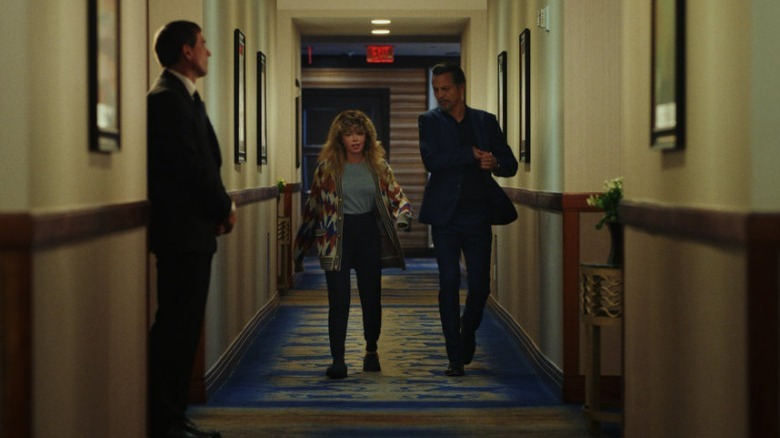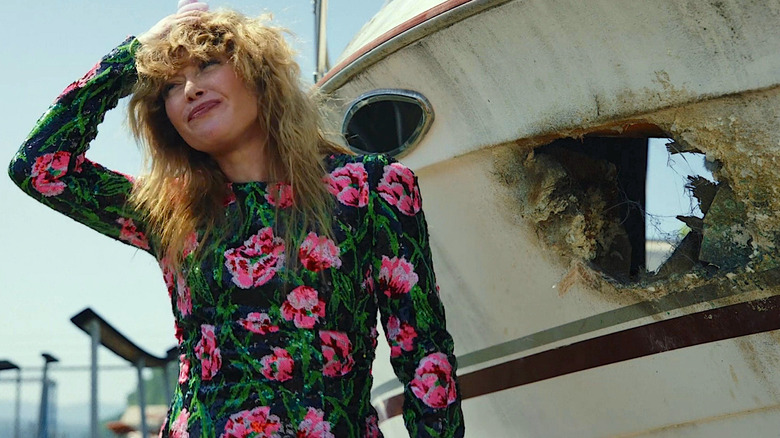The Ending Of Poker Face Explained
The bad guys have come to collect on Charlie Cale. The season finale of "Poker Face" sees our favorite tallboy-swigging human lie detector heal up from her tumble down dead-body mountain just in time to walk into the gaping maw of certain death. That chiseled maw belongs to none other than Cliff Legrand, who's spent a hard year hot on Charlie's tail. He's ready to bring her in, and she's out of options. So how is she gonna get out of this one?
The finale opener is a spicy dash of serialized hot sauce in a rejuvenated recipe of episodic TV. "Poker Face" is the classic detective procedural made new, and its promise to entertain is made good on by every member of its cast and creative team. Cooked up by writer and director Rian Johnson and star Natasha Lyonne, run by seasoned screenwriting sisters Lilla and Nora Zuckerman, and co-starring a stacked guest cast, "Poker Face" took a gamble on "Natasha Lyonne as Columbo" and everybody won big.
Stylish, satisfying, and shot in a sly yet straightforward '70s cinematic throwback, "Poker Face" has brought viewers along on a madcap ride through the country that we never want to end. But now that Season 1 has, we have thoughts on its good old-fashioned TV finale — and all that Blues Traveler. So hop in the Plymouth Barracuda as we take a drive through the ending of "Poker Face" explained.
Rewind the tape
Every episode of "Poker Face" plays with rewinding time, and even though the finale keeps viewers off-balance by messing with the format, we still get a glimpse of the past. Most importantly (and hilariously), we see what Cliff LeGrand has been up to for the last 368 days or so. Hunting Charlie has been an exercise in humility and road food, neither of which sit well with Cliff. He's ready for his own bed (and his own yacht) by the time he tracks Charlie down, and we learn through his flashbacks that when he utters, "tell me how to deep to dig the hole," it's not said to Mr. Sterling Frost Sr. — it's directed at Beatrix Hasp.
Cliff is sick of being taken for granted by Frost and is ready to double-cross his boss. Frost has become keenly aware of the business opportunity available to him in Charlie, and while he was more than ready to kill her before, their tête-à-tête at the Hasp Casino has him bonding with her — especially over the "three things" speech.
In Episode 1, Sterling Jr. tells Charlie that his dad gave him three pieces of advice on running the casino, and the last bit didn't matter. In the finale, the older Frost tells Charlie the first two pieces of advice don't matter, but the one his son omitted does — don't work with Beatrix Hasp.
The sell-out wore sequins
Will Charlie sell out to the scumbags who killed her friend back in Episode 1? It sure looks like it early on in the "Poker Face" season finale. Even when Charlie gets added confirmation Cliff killed Natalie, she seems to take Sterling Frost's offer to work for him (and with Cliff) too seriously for comfort. Charlie's serious consideration of breaking bad is a clever and chilling twist on the show's typical format.
In other episodes, this is the part of the story where we see what greedy motive tempts the bad guy to kill. However, in the finale, we see Charlie tempted to become a bad guy herself. If Mr. Sterling Frost can forget his own qualms about his son's death to use Charlie to hold strong against the Hasps, why shouldn't Charlie get her life back with a hefty $500,000 bonus by forgetting Natalie's death to become Frost's lie-detecting pet?
What makes Charlie's possible submission to a scummy fate even scarier is how we've seen her cave to temptation multiple times by this point. In the car with Cliff, she attempts to ride in the trunk, then bails to ride in the front. At Frost Casino, she refuses a drink — then orders a beer. And when Frost confirms she can walk free if she wants, she runs — only to return to take the bait — until she's set up to take the fall for Frost's sudden death.
Murder under blacklight
Never trust a henchman that knows his way around a party supply store. Cliff LeGrand pulls off a masterful double-cross in "Poker Face" using his own rage, cunning, and some novelty poker chips he probably picked up from Spencer's in the mall. Cliff frames Charlie for Sterling Frost's murder, but how? Life comes at you fast, but revolver switcheroos and blacklight-assisted assassinations come at you faster.
Cliff captures Charlie in Denver. When Charlie asks him if he pulled the trigger on Natalie, he mind-games her rather than respond with a simple "Yup." He instructs Charlie to pull the weapon he "used" from the glove compartment. She does, but can't bear to shoot him and puts it back. Later — when she's asleep and handcuffed to a hotel bed — he sneaks out to the car and grabs the gun while being careful not to get his prints on it.
Later, when Charlie opens Frost's gift, she pulls out Cliff's gun. Cliff has used a glove to grab the gun Charlie touched in the car, holstered it, and now draws it on Frost. Cliff, aided by his blacklight pointer and a planted novelty poker chip, shoots to kill Frost with the gun covered in Charlie's prints. He switches the gun, taking back his own weapon in the aftermath.
The hook brings you back
Just like Rian Johnson's hook tweet promised, the hook is a major metaphor at work in the season finale of "Poker Face." Cliff LeGrand is imperious about the hook's power after Charlie admits that it was inevitable Frost would find her. Cliff punishes Charlie for doubting the hook by making her handle the weapon he used to kill her friend and by doing an intense spoken-word version of the Blues Traveler's hit "Hook."
Cliff's take on the '90s blues folk jam reminds Charlie that people are drawn to certain melodies or patterns time and time again, hoping for truth or bigger meaning — even if all they get is a manipulative bit of mechanics. Frost backs this up in a different way, telling Charlie he can't retire even if he wants to because all he's good at is running a casino. He admits he's good at it for the same reasons he is bad at being a dad and tells Charlie, "There's nothing that pulls you in more than being really good at something for unhealthy reasons."
Later, Charlie's sister condemns her for choosing a life of sticky situations. Though we don't know much about Emily, it's clear she's part of Charlie's cost of doing good with others. Charlie might be hooked on easy outs, but she's also hooked on caring for the people she meets on the road.
This MTV is not for free
Everything costs something. For all her good cheer as she blows through murder town after murder town, the "Poker Face" finale makes it clear that the road is getting to Charlie — or maybe it's just the inevitability of capture. The Season 1 closer is the first time we hear Charlie admit that being caught is a strange form of relief. However, it is also the first time we see Charlie start to really lose her marbles.
Usually a cool cucumber, Charlie has a downright panic attack on the Hasp Casino floor as she demands that Frost tell her what happens now. It's a far cry from the caring, quick-witted, and confident woman we've seen in every episode before. Seeing Charlie's underbelly quiver like this is both relatable and extremely nerve-wracking.
Flailing desperation isn't Charlie's best look, but the toll her fugitive life has taken on her is nothing compared to the emotional cost that comes from the surprise reunion with her sister — for Charlie and for the audience.
Ruinous reunion
Reunited and it feels so bad. Charlie escapes the Feds with help from Special Agent Luca Clark, a well-timed bachelorette party bus, and a quick pit stop with the one friend she might have in Atlantic City — her estranged sister, Emily. Em's barely-contained fury at her sister is matched only by Charlie's open, desperate shame to reunite under such pressing circumstances.
It's clear Charlie and Em's rift stems from an issue with their Dad and something Charlie "chose" to "ruin" with her ability to detect the truth. Charlie gets defensive — she didn't choose this life — but Em disagrees. There is a bit of jealousy the stable sister has for her charming drifter sister, but whatever is between these two runs deep. Though Em doesn't rat Charlie out (or give her a sensible pair of crawling jeans), she does give her some sneakers and a heartbreaking "goodbye forever."
This sister scene mirrors the earlier moment Charlie shared with Mr. Sterling Frost in which he admitted what he's good at makes him bad at being a dad. Em gives Charlie the same credit. She knows her sister does good and has a good heart –- she just "chooses to spend it on strangers" — leaving Charlie speechless.
Lending power to the scene is the fact that it's a screen reunion between Natasha Lyonne and Clea DuVall. The actresses are real-life friends and co-starred in the classic indie film, "But I'm a Cheerleader."
Showdown in boat town
Even though Charlie literally solves a murder in every town she drives through, she looks for the good in people. It's part of what makes her such a charismatic and committed character, but it's also what gets her trapped in the bottom of a boat filled with glow-in-the-dark murder things.
Charlie heads to the marina first to escape on her dad's boat, but when she discovers it's busted, she heads over to Cliff's boat to convince him of her innocence and crack the case of who killed Frost. Charlie expects the best of people, including Cliff, even after all he's done. She thinks he loved Frost, and she couldn't be more wrong. It's an overly trusting move that calls to mind the bonehead trust she showed the old hippies who hand Charlie her lunch in "Time of the Monkey."
Cliff tricks and traps Charlie, gleefully calling out, "You bet a bum hand, Charlie Cale!" Charlie's trust in people doing the right thing for those they love seems to seal her doomed fate — until, of course, she escapes using her can opener and novelty ring. She swims for shore, choosing to once again do something she hates but is good at to survive. Cliff gets his final taste of Blues Travelers justice — his "inevitable" arrest for the Episode 1 murder of Jerry and Natalie Hill.
BFFs with the FBI
Even if Charlie struggles to invest in family relationships, the relationships she builds on the road sometimes come back around to help her. This is abundantly true with Charlie's friend in federal places, Special Agent Luca Clark. Played with understated intensity and pitch-perfect comic timing by Simon Helberg (we will laugh at "thanks you" forever), Agent Clark is the straight-laced straight man to Charlie's wild and free spirit.
"Poker Face" is careful about not making Charlie a cop, and not making her reliant on authorities. She is even betrayed by Sheriff Parker, who rats out her hospital location to Cliff. Still, Charlie's mutually beneficial dynamic with Agent Clark is undeniable. She helps him on his case in "Time of the Monkey," and he helps bring Caine in off her email to the FBI. In the "Poker Face" finale, they help each other again.
Agent Clark gets Charlie out of trouble (and her car back), and Charlie gets Agent Clark another career-making case. In terms of future seasons, it's good for Charlie to have an inside man and good for Luca to have an ace in the hole. Plus, these two have chemistry. Whether you ship them for friendship, a relationship, or help escaping a ship, there's no denying — they're shippable.
The cards we're dealt
"The hook" bringing us back to our inevitable positions on the great checkerboard of life is a major theme in the "Poker Face" finale, but it's not the only one. Playing with the cards you're dealt — and choosing to be a good or sore winner — is another.
Charlie makes clear to her sister that despite what Em thinks, Charlie didn't choose to know the truth when she sees it. Maybe she chooses to call it how she sees it, but that's her life — it's what she's got. Perhaps it's that very emotional reminder from her sister that there's a cost to Charlie's choices that makes her break good again when she gets an offer she shouldn't refuse if she wants to live at all, never mind live easy-breezy.
Charlie could trade her hard-knock life for an easy one working for the big baddie, Beatrix Hasp. Cliff thinks inevitability wins in the end. Sterling Frost thinks being good at one big thing means you're bad at others. Em thinks living in service of your own particular set of skills is a choice made and a line in the sand. However, Charlie splits the difference between all of these opinions on "the hook" when she turns Beatrix down to continue doing good for the world in her own way — and on the run.
Dealers' choice
There are plenty of creative powerhouses dealing out fates for the characters of "Poker Face," but the finale was written by the show's creator — the hook brings you back, after all. According to a tweet by Rian Johnson, writer of "The Hook," this is the first project that he has written but not directed. Janicza Bravo, director of the innovative "Zola," was brought on board by Johnson early in the show's development process, though neither of them were sure which episode Bravo would be directing at first.
Bravo ended up directing "The Hook," which is incidentally the first finale she ever directed. The last episode of Season 1 is also the first episode we get a longer look at Charlie's backstory. Bravo tells The Daily Beast, "It's an opportunity to meet her. The person you've spent nine episodes with is someone that you get little ingredients of, but it's very much like Peter Falk in 'Columbo.'"
Bravo handles Johnson's material and Charlie's hidden tragedy with style and humor. Johnson tells SYFY, "I think I found myself kind of writing, in a way, to her sensibility as I was writing and it was almost like writing a character for an actor." He also tweeted his appreciation for Bravo's direction, saying that he "learned so much watching her work."
What happens now?
By the end of "The Hook," Cliff has flipped on Beatrix Hasp, and the Feds are hot on her tail. Hasp and the Five Families will be watching Charlie like tech-assisted hawks, especially since Charlie turned down the "thoroughly modernized" crime syndicate's offer. Even though Charlie knows she'll be hunted even harder by even more enemies than before, she chooses the road. So which town will Charlie blow into next?
We would love to see Charlie pay further homage to "Columbo" and go head to head with a murderous pair of San Francisco weatherman twins, played by Lyonne's "Russian Doll" co-star, Charlie Barnett. The show has done Subway already, but why not show Charlie some intrigue as she works at a mysterious McDonald's under the St. Louis arch?
Though we know her Barracuda might not be able to handle the transit, let's just say there's a Parisian mystery she has to help her buddy Benoit Blanc tackle. A viewer can dream! Wherever she ends up, audiences and Charlie know she'll be just fine (and murder-solving) wherever she goes.
